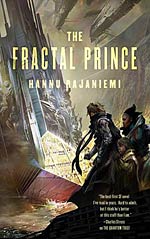
![]() attackofthebooks
attackofthebooks
3/13/2015
![]()
One of the reasons I read non-fiction and classics is that they tend to challenge me more than the books I enjoy reading the most. I'll pick up science-fiction or fantasy because I want to escape, relax, and take a break. But too much, and I get bored.
I did not have that problem when I read this book. Not one bit.
Hannu Rajaniemi, though, has found a way to both escape and challenge my mind at the same time. The challenge is such that, as I have seen one reviewer note, I would not recommend Rajaniemi's The Quantum Thief trilogy to the "uninitiated" to science fiction. Unlike the Star Wars, or even Star Trek, universes, where the laws of science are as ignored as any swords and sorcery fantasy (and, indeed, Luke Skywalker may have more in common with the questing, sword welding hero than not), Rajaniemi does notignore physics.
He just finds a way to weld physics to do what he wants.
This is not to say that The Fractal Prince is dry and sodden down by the weight of physics. In fact, quite the contrary. Instead, the writing moves so fast, so quickly, that it is only the sprinkling of labels and jargon that reminds me that Rajaniemi is even thinking about it. What makes it feel real is this very awareness. The Fractal Prince is so far into the future that it is difficult recognizing what humanity has become. A lot of writers decide to slow down the technological progress when this happens to enable them to anchor their story in a reality that is easier to describe, if just because it looks like our own reality, but more shiny, with more space ships that look and move like gravity bound jet craft and laser guns that act more like semi-automatic firearms.
Perhaps it is because Rananiemi's is so cavalier about his ambition to create and remain honest to the setting of his story that his ambition is understated. In the universe of The Quantum Thief-who we might as well just call by name-in Jean de Flambeu's universe, we cannot help but see the characters as foreign, even alien. Gods and goddesses compete with warminds and self-loops, and a dozen other entities, all apparently descended from the race we call humanity, somehow melded by technology and preserved, copied, enhanced, and expanded.
And if that doesn't all blow your mind (at least when you read it), it's probably because you've become lost in the jargon. Rajanamiemi pulls terms from a half dozen languages that are not native to our planet, but totally uncommon to the western reader. I admit that I drew on Google more than once to get the gist for what he was intending with a word, and then even then I had to add to what I found an expanded understanding of what it meant in the context of the Quantum Thief, universe. Russian, Japanese, and Finnish all contribute to the vocabulary.
Pick up the book, though, push through the vocabulary, and you might find yourself a story that is both creative and familiar. Taking place in the space between Mars, where most of the plot in the first book in the trilogy took place, and Earth and on Earth itself,The Fractal Prince takes a page from A Thousand and One Nights . Not only is the setting of the heist a world reminiscent of the pre-Islamic Arabic world, but takes place in a shining city on the edge of a hostile desert, where decay and corruption are hiding just below the surface and where a story is as forbidden as the worship of images in modern day Islam. And yet, like our own world, the forbidden become a currency in themselves...
At its root, under all the science, the fiction, the clever jargon and imaginative settings, this is the story of a heist, and Rajanamiemi lays the pieces in place carefully, hiding strings until the end, letting the reader see them only as the plot comes together to a final denoument that is fully satisfying.
But do not going into it without your eyes wide open. This is not space opera. It's science fiction, and Rajanamiemi does it well. It will both challenge and entertain, and really, that's what good fiction should do.
http://www.attackofthebooks.com/review-the-fractal-prince-by-hannu-rajaniemi/